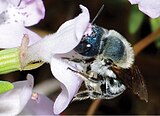Template:Did you know nominations/Osmia calaminthae
- The following is an archived discussion of the DYK nomination of the article below. Please do not modify this page. Subsequent comments should be made on the appropriate discussion page (such as this nomination's talk page, the article's talk page or Wikipedia talk:Did you know), unless there is consensus to re-open the discussion at this page. No further edits should be made to this page.
The result was: promoted by The Squirrel Conspiracy (talk) 21:20, 28 May 2020 (UTC)
| DYK toolbox |
|---|
Osmia calaminthae
... that it the extremely rare blue calamintha bee was actually thought extinct until being observed again in March 2020
... that scientists were unsure as to whether or not the extremely rare blue calamintha bee (pictured) still existed, but the bee was again observed in March 2020?
- Reviewed: Drużbart
Converted from a redirect by 3family6 (talk). Self-nominated at 17:21, 15 May 2020 (UTC).
 Hold up: this hook (along with some sensationalist headlines) misrepresents reality. The Florida Museum press release states "scientists weren't sure the bee still existed", later mentions "last observed in 2016", quotes a researcher who "was open to the possibility that we may not find the bee at all", and doesn't use the word extinct or extinction anywhere. The Weather Channel (not really known for its biological reporting) notes "Scientists weren't sure the bee still existed," but apparently spun this to "long thought lost" in the lead and title. Open to the possibility of extinction does not equal "actually thought extinct", and 2016 was only 4 years ago, making "long lost" a stretch. Some other non-scientific reporting on the rediscovery use "extinct" rather carelessly (e.g. Global News and MSN), while others (e.g. The Week) use more honest language like "thought may have become extinct", which maybe doesn't have the same drama as "long lost presumed extinct bee rediscovered!", but is more accurate. When reliable sources apparently contradict each other (or objective reality), only the most authoritative source(s) should be used, or only most conservative statements included in an article. A DYK hook should not perpetuate the distortion. A new one is needed. --Animalparty! (talk) 22:51, 15 May 2020 (UTC)
Hold up: this hook (along with some sensationalist headlines) misrepresents reality. The Florida Museum press release states "scientists weren't sure the bee still existed", later mentions "last observed in 2016", quotes a researcher who "was open to the possibility that we may not find the bee at all", and doesn't use the word extinct or extinction anywhere. The Weather Channel (not really known for its biological reporting) notes "Scientists weren't sure the bee still existed," but apparently spun this to "long thought lost" in the lead and title. Open to the possibility of extinction does not equal "actually thought extinct", and 2016 was only 4 years ago, making "long lost" a stretch. Some other non-scientific reporting on the rediscovery use "extinct" rather carelessly (e.g. Global News and MSN), while others (e.g. The Week) use more honest language like "thought may have become extinct", which maybe doesn't have the same drama as "long lost presumed extinct bee rediscovered!", but is more accurate. When reliable sources apparently contradict each other (or objective reality), only the most authoritative source(s) should be used, or only most conservative statements included in an article. A DYK hook should not perpetuate the distortion. A new one is needed. --Animalparty! (talk) 22:51, 15 May 2020 (UTC)
- --Animalparty! --- thanks for the catch, I only checked the Weather Channel ref and obviously the title bamboozled me. I agree a better source, or a new hook, is needed. Chetsford (talk) 00:04, 16 May 2020 (UTC)
Thank you, Animalparty, this was a misunderstanding on my part. I've amended the hook, thank you for your improvements to the article. I've also added an image, now that those are present, thanks for those! Chetsford, what do you think of the new hook?--3family6 (Talk to me | See what I have done) 02:24, 16 May 2020 (UTC)
